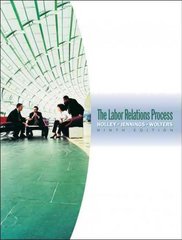2. If an employer were found guilty of bad-faith bargaining in a case like this, should employees...
Question:
2. If an employer were found guilty of bad-faith bargaining in a case like this, should employees be entitled to a back-pay remedy? If so, how could the NLRB determine the appropriate amount to be awarded? For a three-year period the employer granted no wage increases to employees due to the company’s adverse financial situation.
In July 1999, the employer implemented a new policy to provide an annual wage improvement for employees. Each employee’s annual wage improvement was comprised of two components:
(a) a fixed percentage of the employee’s base hourly wage rate, which all employees received, and
(b) an additional merit-based percentage increase, which varied depending upon management’s evaluation of each employee’s job performance. The employer considered factors such as the cost of living, the company’s current and projected financial situation, and the amount granted by other employers in the industry to determine the amount of the across the board percentage increase.
On July 1, 1999 and 2000 employees received a three percent across-the-board increase and merit increases ranging from zero to two percent. On July 1, 2001 the employer granted a four percent across-the-board increase and merit increases ranging from zero to two percent.
Step by Step Answer:

The Labor Relations Process
ISBN: 9780324421446
9th Edition
Authors: William H Holley, Kenneth M Jennings, Roger S Wolters






